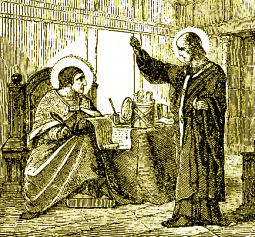Lives of the Saints
Our Models and Protectors
Spiritual Bouquet:
"He who would save his life will lose it."
St. Mark 8:35
April 17

Saint Anicetus
Pope, Martyr
(† 161)
Saint Anicetus, the eleventh successor of Saint Peter, succeeded to Saint Pius I and reigned for eleven years. During that time he had to combat in particular the dangerous errors of gnosticism, Christ's ancient enemy, already rampant in the days when Saint John the Apostle wrote his letters to the churches of Asia. Saint Anicetus was visited in Rome by Saint Polycarp, bishop of Smyrna, who desired to consult with him, and whom he in turn asked to celebrate the feast of Easter in the Church of Rome, as Saint Ireneus, Polycarp's disciple, relates. They had not been able to find a solution to the question of a difference in the date of Easter in the Orient and the Occident, which Pope Saint Victor would later settle, but remained close friends. Saint Anicetus' vigilance protected his flock from the wiles of the false preachers Valentine and Marcion, who were attempting to corrupt the faith in the capital of the empire.
Saint Anicetus established the tonsure for the clergy as a practice of ecclesiastical discipline; a letter to this purpose, which he wrote to the bishops of the churches of Gaul, is still extant.
The Roman Breviary tells us that he received the palm of martyrdom for the Christian faith, one month after the death of the Emperor Antoninus the Pious. Of the first fifty-four bishops of Rome, as they are seen portrayed in the Basilica of Saint Paul in Rome, fifty-three are honored among the Saints; and of two hundred and forty-eight popes, from Saint Peter to Clement XII (?1740), seventy-eight are named in the Roman martyrology. In the primitive ages the spirit of fervor and perfect sanctity was conspicuous in most of the faithful, and especially in their pastors. The whole tenor of their lives breathed it, in such wise as to render them living miracles, angels on earth, breathing copies of their Divine Redeemer, the odor of whose virtues and holy law and religion they spread on every side.
Reflection. We find an example of true friendship in the fashion Saint Anicet honored Saint Polycarp, in the absence of a complete understanding. Let us judge by this rule whether our love and our friendship for God is sovereign. Does inconstancy, manifested in our words or acts, never betray the insincerity of our heart? If, after making protestations of inviolable friendship and affection for a fellow-creature, we ceased to honor him when our reason and his did not perfectly concur, would not the whole world justly call our pretended friendship a mockery?
Les Petits Bollandistes: Vies des Saints, by Msgr. Paul Guérin (Bloud et Barral: Paris, 1882), Vol. 4; Little Pictorial Lives of the Saints, a compilation based on Butler's Lives of the Saints and other sources by John Gilmary Shea (Benziger Brothers: New York, 1894).